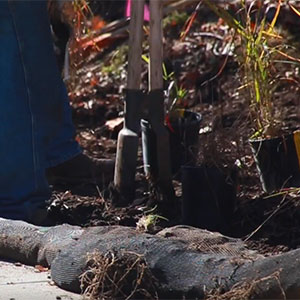October 27, 2020
Food Waste Finds New Use as Compost in K-State Program

Several Kansas State University groups have worked together to find a second use for nearly 50 tons of food each year that would otherwise be headed for a landfill.
They’re mixing food waste from three dining halls on the Manhattan campus with other compostable materials to provide a boost to soil, as well as support some agricultural research projects at the university.
“Specific to agriculture, the benefit of composting this material is that plant nutrients – such as nitrogen, phosphorus, potassium, sulfur and some micronutrients – are cycled and applied to grow more food, rather than going to the landfill,” said Deann Presley, a professor of agronomy and soil management specialist with K-State Research and Extension.
“Compost adds organic matter to soil, which has many benefits including nutrient cycling (a process of moving nutrients through an environment) and improved water holding capacity, and in particular benefits soils that might have been eroded or degraded.”
In 2019, approximately 96,971 pounds of food was recycled as compost.
“We have been partners in the program for many years,” said Camille Korenek, assistant director of K-State’s Housing and Dining Services.
Korenek said some food waste is collected before it ever reaches consumers -- in this case, K-State students. That includes such items as rinds or peelings from the fruit and vegetable preparation areas.
“We also collect food waste from our serving lines when an item no longer meets our quality standards for serving to customers,” Korenek said. “And prior to COVID-19, our smallest dining center (Van Zile Hall) was collecting post-consumer food waste from students' trays.”
The food is gathered in large barrels lined with biodegradable bags. Twice a week, the barrels – each weighing about 80 to 90 pounds -- are either delivered by the dining center or picked up by the K-State Recycling Center and transported to the agronomy farm north of campus. Some of the food waste also is used as compost in campus greenhouses.
“We use a windrow composting method,” said Presley, noting the process of piling organic matter or biodegradable waste into long rows, a technique that is conducive to producing large volumes of compost. At that scale (more than a half acre), she notes, composting must be approved by the Kansas Department of Health and Environment’s Bureau of Waste Management, which regulates composting in the state.
K-State recycling coordinator Bill Spiegel has helped steer the program for nine years. He said the project also includes efforts to curb food waste.
“We have tried measures to reduce this by running programs showing students how much food is wasted and encouraging them to take only what you can consume, showing them where the waste goes, and the costs involved,” he said.
“Minimizing food waste is always central to our daily operations,” Korenek added. “Production managers are constantly looking at historical data, traffic flow, the popularity of menu items, weather, campus events and more to predict and respond by making adjustments to what we produce.”
Korenek, who also is an instructor in the Food, Nutrition, Dietetics and Health program, said those production principles are taught in college classes.
Presley said the project is successful because the groups involved see a direct benefit.
“I love composting and keeping things out of landfills where they take up space and produce powerful greenhouse gases like methane,” she said. “And I have been told by dining center staff that they enjoy diverting food waste from trash cans and garbage disposals because they know the effort that goes into making food. They’d rather see it reused than completely discarded.”
A video depicting K-State’s program to recycle food waste as compost is available online.